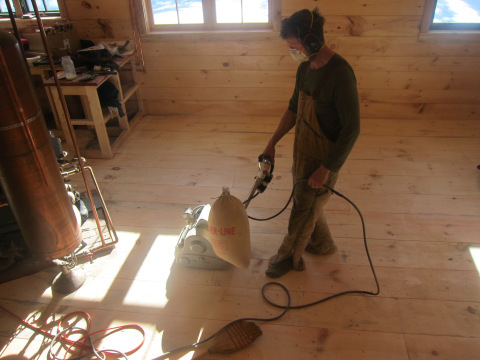Sometimes I Just Stand There

Sanding the floor
Over the weekend we began the move from barn to house, hauling our dressers out the sliding door that connects hay storage to the cows’ run-in shed. This necessitated navigating a minefield of bovine feces, frozen into ankle-twisting mounds like some strange winter-blooming ground fruit.
I was in a foul mood for no reason other than I’d chosen to be. I knew this, yet could not bring myself to choose otherwise, and as I trudged between barn and house and back again, bent under the weight of our furnishings, weaving an unsteady path through the shit, I marveled at the fickle nature of human emotion. I could identify no root cause of my sourness; indeed, all evidence supported ebullience or, at the very least, a base level of garden variety contentment, for here we were, after three months of barn living, with its myriad demerits, moving onto greener pastures. A doubling of space, a counter top, a sink, and so on. Eventually, even a shower! Much of it still crude by contemporary first-world standards, but hey.
Someone asked in the comments section a while back if I thought we’d be as content with our rustic circumstances if we didn’t have something more commodious pending, how we’d feel if we understood that rather than a being a mere blip in the timeline of our lives, that single room in the barn was as good as it gets. Good as it’d ever be. From here until forever more, that one room, the cold floor, the two bare bulbs, the iced-over windows. And so on.
I thought about this a while, and that led me to thinking about that interview with Stephen Jenkinson I mentioned a while back, in which he talks about hope, and, specifically, how dangerous it can be. Because of course hope is always a future tense condition; you cannot hope for the present moment or for your current circumstances. Thus hope becomes a leash that pulls you incessantly forward, out of this moment and into some unknown future that, no matter how fervently you hope (pray, dream, aspire, wish), might well be no better than the present.
In this manner, hope becomes (or at the very least risks becoming) an anesthetic, a painkiller for what exists in the here and now. Thus sedated, the urgency to affect real change becomes less pressing. It’s easier to simply endure and continue lathering on the hope. Jenkinson talks about being “hope-free” rather than hopeless, a condition I interpret as one of clear-eyed pragmatism, marked by an understanding that neither hope nor hopelessness ever changes one’s life for the better. I’d also add cynicism to that list, because what is cynicism but hopelessness with intellect?
I don’t necessarily agree or disagree with this view, although it’s true I’m not much of a hoper. But it’s also true that my life is an embarrassment of riches; materially, I want for nothing, and all the hope in the world will have no impact on my family’s continued health and well-being. And while I might bemoan the myriad outrages of our political and economic institutions (to name just two of the institutions that compel me to launch into one of my frequent mouth-foaming tirades, particularly if I’m onto a second beer and in the presence of like-minded company), I know that hoping for their reform will change nothing.
So. Would I have been as content living in our barn if the house were not on the horizon? I suppose I cannot say, because that was never our circumstance. Indeed, we did know the house was pending, and maybe that’s what allowed us to inhabit the barn with relative equanimity, sort of like how you endure quinoa and kale casserole because you know there’s banana cream pie for dessert.
It’s nice to be in the house, although there is still plenty to do: Interior walls to frame, wiring to complete, french doors to hang (arched, no less!), a tub/shower to install, and so on. Enough to keep us busy on a part-time basis for weeks, if not months, to come. But for now, we’re in thrall to all those rediscovered conveniences we lived without for the past few months. Thanks to the handiwork of our friend Paul, who artfully rigged up an antique copper boiler tank to our wood cookstove, we even have hot water at the kitchen sink. Can you imagine? Hot, running water. Sometimes I just stand there, running it over my hands until my palms turns pink and tingly.

Ben Hewitt's Blog
- Ben Hewitt's profile
- 37 followers



